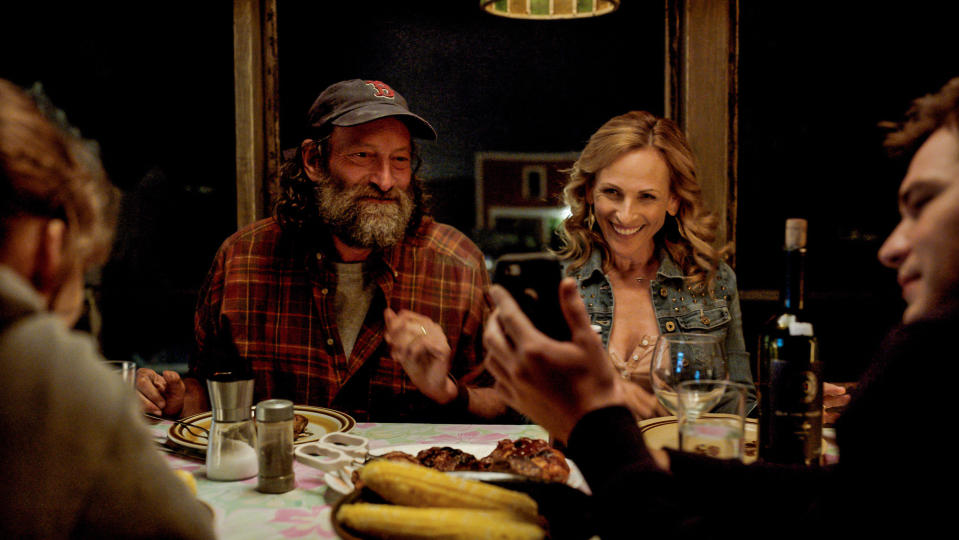Nyle DiMarco: What the big 'CODA' win means to a Deaf actor like me
- Oops!Something went wrong.Please try again later.
- Oops!Something went wrong.Please try again later.
The moment Troy Kotsur was announced as the best supporting actor winner at the Oscars, the Dolby Theater exploded. Just about every single person in the audience rose up to cheer on the first deaf Oscar winner in 35 years. Goosebumps prickled my arms as Troy took hold of his Oscar. At that moment, millions of people watching on their TVs all over the world were introduced to an extraordinary talent and an even better person.
As Troy gave his award speech, I couldn’t help but think about how the Deaf community had already known of Troy’s talent long ago. I first learned of Troy when I was a young teenager. My Deaf mom told me of a handsome actor who had a piercing gaze and a gift for cinematic, eye-popping American Sign Language. His name came up in my conversations with Deaf friends from time to time. He worked on his craft in Deaf theater productions for decades, mostly unknown outside of our community, until he finally got his well-deserved opportunity. "CODA" showed the world his talent, and for the first time, a movie led by a Deaf cast won the Oscar for best picture.

For the evening, Deaf and sign language representation weren’t just limited to these two Oscar victories. "Audible," a short documentary about the football program at Maryland School for the Deaf, which I served as an executive producer on, was also nominated. Two other nominees, "Dune" and "Drive My Car," also featured sign language. Altogether, the 2022 Oscars felt like a watershed moment in deaf history.
But that’s what scares me a little bit. Deaf people had another moment similar to Sunday night back in 1987. That was the year Marlee Matlin won a best actress Oscar. It’s taken us 35 years to see another Deaf Oscar winner take the stage.
We need this moment to be something bigger. We need it to be the linchpin for a broader movement, the first swell of a tidal wave of opportunities for Deaf people in entertainment.
To me, the key to turning this moment into a movement includes putting Deaf people behind the camera. In producer roles. In the writer’s room. As directors, closing their index and middle fingers like a pair of scissors, to yell “Cut!”
One amazing twist out of many in Troy’s story is that the role that landed him an Oscar wasn’t going to be available to him in the first place. When Marlee Matlin signed on to "CODA," she insisted on Deaf actors being hired, rather than hearing actors taking on the roles as initially planned. Thankfully, the powers that be relented. No one could play Frank like Troy did, and the rest is history. Marlee’s story is one example of how having Deaf people take the lead in telling stories that involve them can have a powerful impact.
It’s tough to be an actor. It’s even tougher to be a Deaf actor in an industry designed for and run by hearing people. Like many Deaf actors, my experiences on set tend to be more than that of most actors. From captioning my own self-tape auditions, teaching other actors their lines in ASL on set, consulting directors on keeping my hands neatly in frame so no signs are cut off, and sometimes assisting with post-production edits and captioning to ensure ASL is captured on screen and translated accurately, there are many, many hats we wear as Deaf actors. We do it because we love our craft despite the divided attention, but for a story to be told as best as it possibly can, there needs to be more of us behind every aspect of the storytelling.
I know Deaf people can be successful in non-acting roles in the entertainment industry. I’ve seen it firsthand as an executive producer on the Netflix docuseries "Deaf U." Members of the Deaf community made up 30% of the crew, 60% of the story department producers and 30% of the edit team. All offered extremely valuable life experiences and insight, which made our show so unique. As I stepped into more producer roles, I created the production company Clerc Studios, which is committed to empowering and amplifying the stories of Deaf/Disabled people, which make up the world’s largest minority. I’m grateful to be working with other open-minded partners who understand how important genuine and authentic representation is. I’m far from the only Deaf person taking on Deaf storytelling in Hollywood. I encourage everyone to follow and get to know the works of others, too: Shoshannah Stern and Josh Feldman, who created, wrote and starred in "This Close"; Oscar winner Marlee Matlin, who is set to direct an episode of the drama series "Accused"; Marvel superhero Lauren Ridloff, who is working on a project with Ava DuVernay; Millie Simmonds, who is adding executive producer to her resume with a TV adaptation of "True Biz"; and Douglas Ridloff, who is a consulting producer on Marvel’s upcoming series, "Echo." The list is growing.
When "Audible" was nominated for an Oscar, I tasted one of the greatest honors a filmmaker could get. But I realize that I have been blessed with an arguably greater honor: the chance to collaborate with and create opportunities for other Deaf creators.
Troy’s moment on Sunday was incredible. I’ll remember bearing witness to it for the rest of my life. I am also making a promise not to let it be the last such moment in my lifetime.
Let’s turn that moment into a movement. To the people of Hollywood: If you want more amazing Deaf stories, continue to invest in us. You won’t be disappointed.

